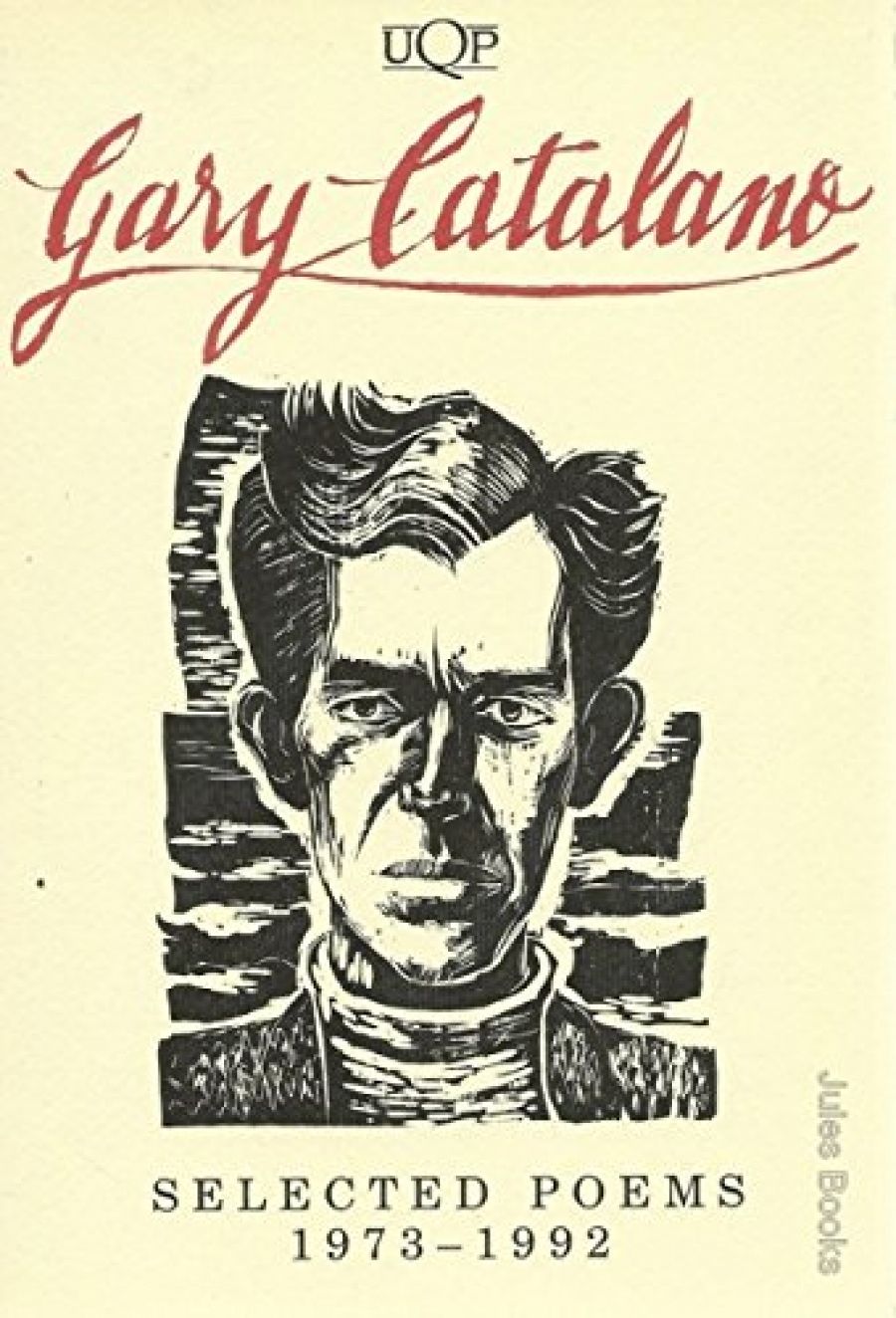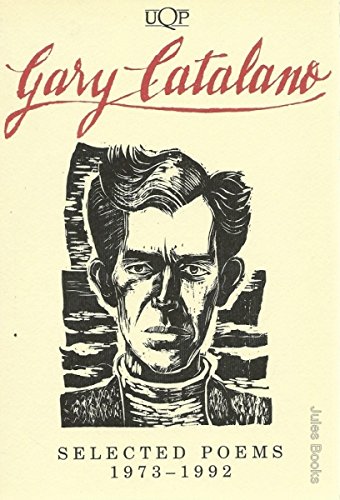
- Free Article: No
- Contents Category: Poetry
- Custom Article Title: The Catalano world
- Review Article: Yes
- Article Title: The Catalano world
- Online Only: No
- Custom Highlight Text:
Gary Catalano was, by profession, a writer about art. But he was also a fine poet with a distinctive style. On no account was he neglected – he appears in most anthologies that ought to include him – but he often seemed to be writing in an entirely different idiom from that of his contemporaries. He was difficult to place and thus, perhaps, difficult to appreciate.
- Book 1 Title: New and Selected Poems 1973-2002
- Book 1 Biblio: Gininderra Press, $30 pb, 219 pp, 9781740274302
- Book 1 Cover Small (400 x 600):

- Book 1 Cover (800 x 1200):

Each time I have come to the work of Gary Catalano, either as editor (Slow Tennis [1984], Fresh Linen [1988]) or as reviewer (Heaven of Rags: Forty Poems 1978–1981 [1982], Jigsaw [1998]), I have tried to make some overall description of what he is doing. The style is so distinctive that it ought to be easy, but it has proven surprisingly elusive. Such beautifully shaped poems should share some underlying structures, but these seem, even to an admirer, very hard to find.
Some parts of the description are easy, though. Catalano writes in two modes: the prose poem and the slender lyric in which the patterning of syntax plays against the frequent line endings, so that, in a good example, the poem’s meaning seems to fall through its own shape. The poems, as one might expect, are profoundly visual, and a high value is placed on arrangement at all levels, from the syntax of a single poem to the organisation of the poems in a book. More importantly, the poems are rarely flat or predictable, often because they keep the reader slightly off balance. Prose poems are a wonderful form for universes where we are not exactly confident that we understand the logic that rules them, but sometimes the more conventional poems finish up in entirely different places from where we expected them to go when we innocently began them. There is the first poem of Catalano’s second book, Heaven of Rags, for example, which begins:
It, too, is your enemy
You take it in and out
yet it leaves no taste
to remember it by:
there is only
that constant need
for more. Like you
I would like to
puncture its quiet perfection …
That second word, ‘too’, troubles you right throughout the poem. And the beginning of the second sentence is disorientating because we realise that the ‘you’ of the first sentence is not a generalised ‘you’ of lyric poetry but is actually specific: it is an ‘us’ that the writer of the poem suddenly joins with. The poem’s conclusion is more predictable than its opening and is a slight let-down, but it exemplifies the experience of reading Catalano’s work. Complicating these generalised descriptions is the fact that Catalano’s poetry is not all of a piece. Each of the books, though they have nothing so crude as a theme, leans towards an emphasis of particular aspects of the Catalano world. Heaven of Rags, though it contains a section that is made up of portraits and thus looks backwards to Remembering the Rural Life, also introduces prose poems, as well as the idea of the private life of objects. This is taken up in the next book, Slow Tennis, but the poems of that book are also inclined to stress the mysterious inner processes of perception. The title poem of that book is one of Catalano’s masterpieces. Beginning ‘There is a tree / at the far end / of my thoughts. It appears now // as a vague / irregular blob, no larger / than a tennis ball //and just clips / the sagging net / of the horizon’, it concludes:
Slow tennis
could well be the name
of this game: the object of it
is to whack these
battered, deflated trees
from one half
of the brain
to the other.
Brilliant, deceptively simple and difficult to feel absolutely comfortable with.
The Empire of Grass (1991) is, as the second word in its title suggests, a book looking outwards to the macro-social and macro-political structures of the world. It would be easy to overstate this and thus give the wrong impression. This more ‘engaged’ view is worn lightly, often little more than an aftertaste, but it is clearly there and is announced in another wonderful but elusive title poem.
So The Master of Faux Bois (this title is, throughout the book, code for Georges Braque) is not a simple and predictable annex to the Catalano world. It is partly a book of ‘coming home’. A walk on a cold morning means that each breath is a dense cloud ‘straight out of Léger // or Monet’s painting / of the Gare St-Lazare’. Passing a cemetery that contains the tombs of Diderot and Corneille, Catalano realises he should have entered it though the poem ends with a twist that takes us from the world of art to that revolution when it comments that the cemetery is
bullet-pocked façade
stood mute witness
when the poor Austrian went off
to meet her maker
in the Place de la Concorde.
And, in one fine prose poem, ‘Theatre’, Catalano, after emerging from the Parisian catacombs, finds himself in front of a Notre Dame enveloped in scaffolding with hessian between, looking for all the world like a stage set: ‘that curtain was the perfect touch, for Paris has always been our theatre of dreams.’
The Master of Faux Bois is made up of the same two modes as in Catalano’s other work: prose poems (‘To Quote Verlaine’, recreating Akhmatova’s meeting in Paris with Modigliani, is perhaps the best) alternate with spare, dry but suggestive lyrics. Since his poetic assumptions and style are so different to those of his compatriots, he can act as an interesting (if accidental) commentator on the scene of Australian poetry, reminding us how wordy and unminimal our poetry is, how it keeps itself afloat by endlessly talking, perhaps talking largely to itself. Occasionally, Catalano is overt about the poetry of his homeland and it is fitting that ‘Australian Poetry’ (from The Empire of Grass) should begin with a judgment based on that poetry’s visual responses and conclude with a hermeneutic one:
The lines I’ve come to prefer
are those which treat
of the hard and physical light.
…
Oh, there is one thing more:
most of the readings are held
in a town called Understanding
which, it is said, has a single street.


Comments powered by CComment